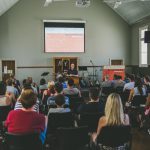The small-town pastor can find himself face to face with a host of needs and struggles. Virtually every week I receive a call from someone from outside the church seeking help to pay his or her electric bill, from a senior adult struggling to buy food between Social Security checks, or from a mother unable to buy medicine for her child. Hidden behind many of these physical and material needs is an urgent need for the gospel. Indeed, every such phone call, office visit, or request for counsel is a unique opportunity for evangelism. Churches in smaller communities stand face to face with real needs. Yet I admit that I’ve struggled to discern how to help without becoming overwhelmed.
In 2005 we were a young and small church plant in central Kentucky, just south of Louisville. We met in a storefront property in beautiful downtown Bardstown. Along with the multiple benefits that came from a visible location downtown was the reality that we were within walking distance of some of the poorest people in our community. Very quickly people started dropping into the office throughout the week to seek help, often struggling financially, facing eviction, or fighting to meet the needs of their children. More often than not I had to turn people away. We simply didn’t have the resources, time, or capacity to respond to every need. We couldn’t just ignore the needs, though. We had to do something even though we couldn’t do it all. Surely there have to be other churches dealing with these same issues, we thought.
So we initiated a conversation with other local church leaders and civic organizations, and what developed over time has been the fruit of like-minded, gospel-centered churches partnering to reach out to some of our communities’ most needy and vulnerable.
New Life Center
In short, we developed what is today known ast the New Life Center. It’s a non-profit organization that provides mentoring and support to families in crisis. Our aim is clear: we want to connect our clients to the local church. Our strategy is simple: we provide one-on-one mentorship to help equip our clients to make healthy life choices, we provide material help to our clients while they’re in an ongoing mentoring relationship, and we proclaim the gospel—-for the gospel alone brings true freedom and lasting life change.
The New Life Center currently employs three staff members, has around eight to ten regular volunteers, is governed by a board of directors, and is actively serving as many as sixty clients. It is funded, led, and staffed by a partnership of local churches. The board of directors comprises leaders from five local churches. The volunteers who work alongside each other represent a number of churches in our county. The work is funded in part by grants and fundraising events but primarily by our partner churches.
Mentors are encouraged and trained to share the gospel with their clients and to personally invite their clients to join them at their respective churches. We’ve seen this to be fruitful. One recent Sunday, I heard of one of our clients professing faith while attending church with his mentor. The church I pastor gets to rejoice and celebrate with our partner church in that profession.
While the New Life Center doesn’t meet every need, it does touch upon most—-drug and alcohol addiction, abuse and neglect, poverty, and relationship struggles. Our church couldn’t do this without associating with other churches. We couldn’t pay three staff members or provide sufficient volunteers to serve the number of clients the center serves. I don’t deny that some churches could have done this alone. However, even if we could have done so, I believe it is far better to do this work in partnership with other like-minded, gospel-preaching churches. There is something edifying, unifying, and God-exalting about believers working side by side to meet the needs of our community as we make Jesus known.
We can look at the needs in our little community and bunker down, feeling too tiny and ill-equipped to respond. But the church that Christ is building is never small—-and it’s a church always meeting people at their points of need and crisis.

































